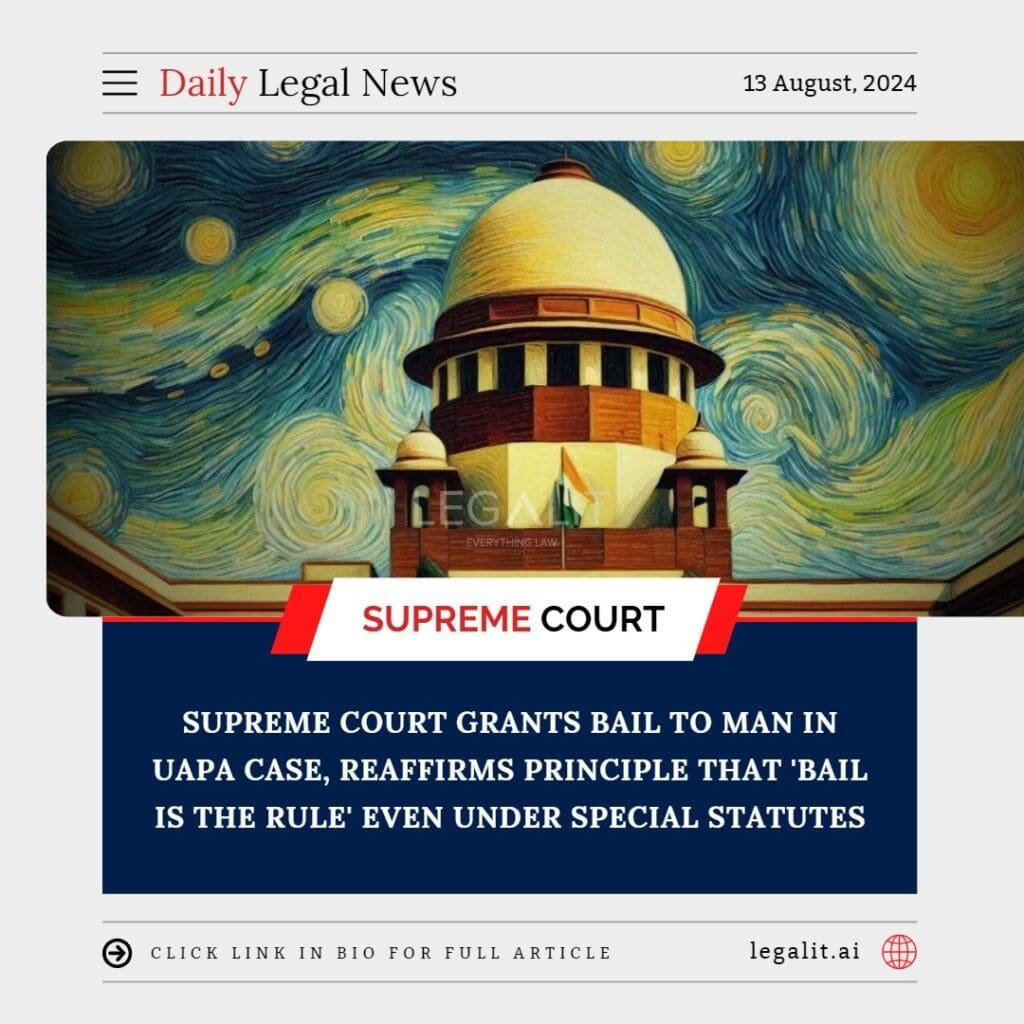
In a significant ruling, the Supreme Court of India granted bail to a man accused under the Unlawful Activities (Prevention) Act (UAPA), reiterating the legal principle that “bail is the rule, jail is the exception,” even in cases involving special statutes like the UAPA. This decision underscores the judiciary’s commitment to safeguarding individual rights and ensuring that the presumption of innocence is maintained throughout the legal process.
Background of the Case
The case involves an individual who was arrested and charged under the UAPA, a stringent anti-terrorism law designed to prevent unlawful activities and protect national security. The UAPA grants the government broad powers to detain individuals suspected of involvement in terrorism-related activities, often leading to prolonged detention without trial. In recent years, the UAPA has come under scrutiny for its potential to be used against individuals in cases where the evidence is not conclusively strong, raising concerns about its impact on civil liberties.
The accused in this case had been in custody for a significant period while awaiting trial. Despite the serious charges against him, the accused argued that he should be granted bail, as the evidence against him was not compelling enough to justify continued detention, and the trial was unlikely to conclude soon.
Supreme Court’s Ruling
- Granting of Bail: The Supreme Court granted bail to the accused, emphasizing that the principle of bail being the norm and jail the exception applies even under special statutes like the UAPA. The Court noted that while national security concerns are paramount, the rights of the individual must also be protected, especially when the evidence presented does not unequivocally establish guilt.
- Presumption of Innocence: The Court reiterated that the presumption of innocence is a fundamental principle of criminal law, and an individual should not be deprived of their liberty for an extended period unless there is strong and compelling evidence to justify such detention.
- Delay in Trial: The Court expressed concern over the delays in the trial process, noting that prolonged detention without trial can infringe on an individual’s fundamental rights. The Court emphasized the need to balance the interests of justice with the need to protect individual freedoms.
- Application of Bail Principles: The ruling makes it clear that the principles governing bail apply universally, even in cases involving special laws like the UAPA. The Court stressed that the judicial system must ensure that statutory provisions are not misused to deny individuals their right to liberty without adequate justification.
Implications of the Ruling
The Supreme Court’s decision to grant bail in this UAPA case has several important implications:
- Strengthening of Civil Liberties: The ruling reinforces the judiciary’s role in protecting civil liberties, even in cases involving serious charges under stringent laws. It ensures that the rights of the accused are not overlooked in the pursuit of national security.
- Judicial Oversight: The decision highlights the importance of judicial oversight in cases involving special statutes like the UAPA. Courts are reminded of their duty to critically assess the evidence and the need for detention, rather than deferring to the prosecution’s claims.
- Encouragement for Expeditious Trials: The ruling may prompt the judicial system to prioritize and expedite trials in cases involving long-term detention, ensuring that justice is not delayed unduly.
- Precedent for Future Cases: The decision sets a precedent for how courts should approach bail applications under special laws, ensuring that the principle of liberty is upheld even in cases where national security is at stake.
- Public Confidence: The ruling may bolster public confidence in the judiciary, reassuring citizens that their rights will be protected, and that the legal system remains committed to fairness and justice.
Moving Forward
Following this ruling, several steps can be taken to ensure the fair and just application of laws like the UAPA:
- Review of Prolonged Detentions: Courts should regularly review cases of prolonged detention under special statutes to ensure that individuals are not held without trial for excessive periods without sufficient evidence.
- Balancing Security and Liberty: The judiciary must continue to balance national security concerns with the protection of individual rights, ensuring that laws like the UAPA are applied in a manner that is both fair and just.
- Promotion of Expeditious Trials: Efforts should be made to expedite the trial process in cases involving serious charges, reducing the risk of prolonged pre-trial detention and ensuring timely justice.
- Awareness and Training: Judges and legal practitioners should be made aware of the importance of applying bail principles even under special statutes, ensuring that the right to liberty is upheld across all cases.
Conclusion
The Supreme Court’s decision to grant bail to a man accused under the UAPA reaffirms the fundamental legal principle that “bail is the rule, jail is the exception,” even in cases involving special statutes. By emphasizing the importance of protecting individual rights and ensuring that detention is not prolonged without sufficient cause, the Court has underscored its commitment to upholding justice and fairness in the legal system. As this ruling sets an important precedent, it serves as a reminder of the judiciary’s critical role in balancing the demands of national security with the protection of civil liberties.